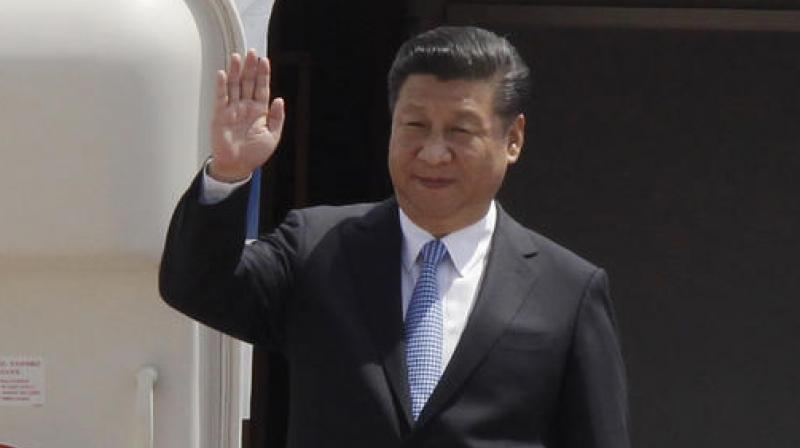Desipte slowdown, BRICS' potential, strength unchanged: Xi Jinping
The potential and the inherent strength of the five-nation grouping of emerging economies continues to be unchanged, said Xi.

Benaulim: Even though the 2008 credit crisis and the "treacherous recovery" of global economy has impacted growth among the BRICS countries, Chinese President Xi Jinping on Sunday said the potential and the inherent strength of the five-nation grouping of emerging economies continues to be unchanged.
Addressing the Business Council Summit here today, the Chinese President said the global economy is yet to fully recover from the 2008 credit crisis and is still struggling with a "treacherous recovery".
Admitting that the crisis of 2008 has not only "slowed down BRICS economies" but they are still "facing challenges" even after eight years of the worst recession since the 1930s, Xi, however, stressed that the "potential and the strength" of the grouping is "unchanged" and they continue to remain positive from a long-term perspective.
He said innovation holds "the key to leapfrog" development in BRICS countries and urged businesses to follow this path for a steady and sustainable economic development.
Even though the global headwinds exist, he said there are both challenges as well as opportunities in this new phase of partnership for the nearly two-decade-old idea of BRICS.
Xi urged the businesses to "seize" all the available opportunities, increase their investments and undertake actions which will boost the confidence of the markets, the public and as well as the international community.
The comments come at a time when the export-led growth model of the Chinese economy has been hit with lingering slowdown due to the crisis in the global economy.
Beijing's decades of high savings and debt-driven investment push failed to create a large domestic market, which in the face of the global slowdown has scuppered the plans of the leaders of the Communist country.
Known for its decades of double-digit growth, the world's second largest economy is also fending of trillions of dollars of bad loans and corruption. The slowdown is so entrenched that many analysts have been warning of a Chinese hard-landing anytime now.
Brazil, the second largest constituent of the five-nation grouping, is also struggling with a near contraction in growth coupled with high inflation and lingering political troubles, while the resources rich Russia is associated with geopolitical risks as it fends for global sanctions following the annexation of the Crimea in Ukraine late last year and the lingering plunge in global crude prices.
Russia is home to one of the world's largest oil reserves, but a near 55 per cent fall in crude and gas prices since the summer of 2014 has left its sanction-hit economy in tatters.
Xi underlined the need for "result-oriented" cooperation among the BRICS and also asked the Business Council to explore the idea of joint implementation of big projects.
The Chinese leader said the New Development Bank, which began operations in Shanghai last year, is the outcome of a similar result-oriented approach and affirmed Beijing's commitment to fully back its activities.
Newly-appointed Brazilian President Michel Temer, who came to power after his predecessor Dilma Rouseff's impeachment a few months back, said his administration will speed up economic reforms by creating more jobs in an anaemic economy and also affirmed his commitment to maintain the ecological concerns.
The largest South American nation will streamline its bureaucracy so that work get implemented faster, Temer said, and declared that his administration has identified as many as 34 projects in the roads, highways, ports and oil sectors to boost an anaemic economy which has been degrowing of late.
He claimed that the largest Latin American economy, which recently hosted the Rio Olympics, already sees signs of the recovery being underway.
Russian President Vladmir Putin said business plays an important role in both sustainability and accelerating growth and underlined that BRICS members are home to some of the most promising consumer markets in the world.
South African President Jacob Zuma said the activities of the BRICS Business Council over the past three years have reached a stage where it can play the role of a catalyst for growth.
Zuma, facing massive unemployment since the return to democracy around two decades back and nationwide students strife, also outlined the areas where partnerships are needed, including insurance and re-insurance, a BRICS seed bank, infrastructure including power generation and transmission, aviation and large scale manufacturing so that massive number of jobs can be created.
The largest African economy has an official unemployment level of 25 per cent while the actual joblessness is much higher.

